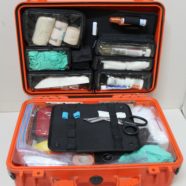
Having a first-aid kit is the best way to be prepared for home injuries and emergencies. Many retailers sell pre-packaged kits, but you can easily build your own. Be sure to include assorted bandages, alcohol wipes, gauze, gauze tape, antiseptic ointment, instant ice packs, sterile eye wash, elastic bandages, bandage scissors and tweezers.
In addition to having a first aid kit easily accessible, you should also know the ABC’s of first aid. The ABCs of first aid refer to: Airway, Blood and Cardio. It is crucial to make sure the injured person can breathe, make sure the person will not bleed to death and make sure that the person’s heart is still beating. Any care provided beyond this should be focused on making sure no further harm is done and that the person is comfortable until help arrives.
Shock – Shock can result from a variety of injuries and circumstances. If you suspect someone is experiencing shock:
- Have the injured person lie down on his or her back and elevate his or her feet higher than the head.
- Keep the person warm with a blanket.
- Treat other injuries such as broken bones that may accompany shock.
- Seek emergency medical attention immediately.
Nosebleeds
- Have the victim sit or stand upright to slow the flow of blood and gently pinch the nose for ten minutes.
- If bleeding persists, call 911.
Burns
- If the skin is not broken, run cool water over the burn for several minutes.
- Cover the burn with a sterile bandage or clean cloth.
- Do not place creams, ointments or ice on the burned area.
Cuts and Scrapes
- Stop bleeding by applying pressure with a sterile gauze pad or clean cloth. If bleeding persists for several minutes after applying pressure, seek medical attention immediately.
Poisoning
- If you cannot identify the poison or there are no instructions on the label, call Poison Control at 1.800.222.1222.
Print this Page | Contact us

